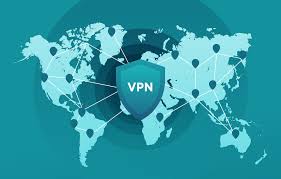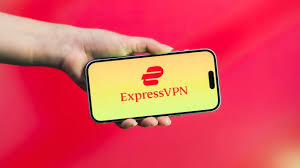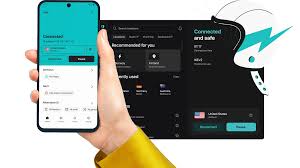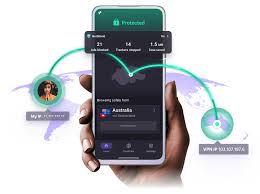Thinking about a VPN but overwhelmed by the options? Good — you’ve come to the right place. Below I’ll explain what a VPN does in plain language, how I judged the contenders, and give you crisp, detailed reviews of the top VPNs people choose in 2025 — what they’re great at, where they wobble, and who should pick them. Protect your privacy, unlock your favorite shows, and browse safely anywhere with these top-rated VPNs. Each is tested for speed, security, and streaming — so you can choose the one that fits your lifestyle.

What is a VPN?
A VPN (Virtual Private Network) is a service that creates a secure, encrypted connection between your device and the internet.
Instead of connecting directly to websites or apps, your data first travels through the VPN’s private server. This hides your IP address (your device’s online identifier), protects your online activity from hackers, internet providers, or government monitoring, and can make it appear as if you’re browsing from another location — useful for privacy, public Wi-Fi safety, and accessing geo-restricted content.
In short: A VPN acts like a private tunnel for your internet traffic — keeping it safe, hidden, and free from prying eyes.
Shop the Latest Bags, Backpads, Back To School Items, Lugages and more on Kipling
Why a VPN still matters
A VPN (Virtual Private Network) encrypts your internet connection and hides your IP address. That helps with:
- blocking snoops on public Wi-Fi,
- preventing trackers and advertisers from mapping your location,
- letting you access apps and streaming libraries from other regions (where legal),
- and — in restrictive countries — providing tools that can help preserve access and privacy.
Use a VPN when you’re on unknown Wi-Fi, doing sensitive work, torrenting (check laws!), or when you need another country’s streaming library. (Also: always read the provider’s terms and local laws.)
How I picked these VPNs
Short list of things that mattered: speed (real-world tests), privacy policy & audits, security features (kill switch, wireguard/modern protocol), server geography, streaming reliability, ease of use, and value (price + features). I leaned on multiple recent expert tests and hands-on reviews to pick winners for different needs.
Top VPNs (my picks & detailed reviews)
1. NordVPN — Best all-rounder
Why it stands out: polished apps, fast modern protocols, large server network and great streaming/torrenting reliability. Tech reviewers consistently put Nord near the top for balancing speed, security and extras like threat protection and mesh networking features.


- Jurisdiction: Panama (privacy-friendly).
- Speeds: Very fast in most tests; ideal for 4K streaming & gaming.
- Security: AES-256, WireGuard-based NordLynx, kill switch, DNS leak protection.
- Extras: Threat protection, Meshnet (private device networking), double VPN options.
- Best for: Most users — streaming, privacy and everyday security.
- Downsides: Not the absolute cheapest; some advanced features can be overwhelming for absolute beginners.
Verdict: A safe, fast, and feature-rich pick for most people who want a reliable all-round VPN.
2. ExpressVPN — Best for streaming & simplicity.
Why it stands out: rock-solid ability to unblock streaming services, extremely user-friendly apps, and a long reputation for reliability. It uses its Lightway protocol and has a strong focus on simplicity and performance. Great if “it just works” is your priority.

What you get
- Jurisdiction: British Virgin Islands (privacy-friendly).
- Speeds & reliability: Excellent, with minimal buffering for high-bitrate video.
- Security: RAM-only servers, Lightway protocol, AES-256, strict no-logs stance.
- Extras: Router app, wide platform support, easy interface.
- Best for: Streamers and non-tech users who want a dependable experience.
- Downsides: Pricier than many rivals; fewer simultaneous connections on basic plans.
Verdict: If you want the smoothest streaming experience with minimal babysitting, ExpressVPN is a top premium choice.

3. Surfshark — Best budget + family option.

Why it stands out: excellent value — unlimited simultaneous devices, strong streaming performance, and many extras for a low price. It’s often recommended for households or folks with many devices.

What you get
- Jurisdiction: Netherlands (note privacy considerations).
- Speeds: Very competitive — WireGuard support keeps performance high.
- Security: WireGuard, AES-256, ad & tracker blocking, MultiHop options.
- Extras: Unlimited devices, CleanWeb ad-blocker, Smart DNS.
- Best for: Families, people with lots of devices, budget-conscious streamers.
- Downsides: Company location and corporate structure cause some users to prefer providers under stricter privacy jurisdictions.
Verdict: Outstanding value — nearly all the benefits of premium VPNs at a fraction of the price.

4. Proton VPN — Best for privacy-minded users (Swiss roots).
Why it stands out: Proton has a strong privacy reputation, independent transparency, and a free tier that’s genuinely useful. If jurisdiction and open-source credentials matter, Proton is a smart pick.

What you get
- Jurisdiction: Switzerland (strong privacy laws).
- Speeds: Solid on paid plans (free plans are slower/limited).
- Security: AES-256, audited apps, Secure Core multi-hop routing, no-logs policy.
- Extras: Free tier, strong privacy culture (same org as Proton Mail).
- Best for: Users who put legal privacy & auditability above raw speed.
- Downsides: Free plan has limits; paid tiers cost more for top speeds/features.
Verdict: If privacy + transparency are your top priorities — and you don’t mind paying a bit more for it — Proton is a top contender.

5. Mullvad — Best for anonymity & minimal data.
Why it stands out: Mullvad’s account-number system (no email required), strong stance on anonymity, and excellent privacy record make it a favorite of privacy purists and activists. Independent labs and privacy communities praise its approach.

What you get
- Jurisdiction: Sweden (but strong privacy practices).
- Speeds: Good, reliable performance.
- Security: Strong encryption, WireGuard support, minimal logging by design.
- Extras: Cash payments and numbered accounts for anonymity.
- Best for: Users who want to sign up with near-zero traceability.
- Downsides: Fewer consumer-friendly extras (like fancy apps or streaming-focused features).
Verdict: The go-to for people who want the cleanest, simplest privacy model with minimal personal data exchange.

Quick Comparison Table
| VPN Service | Speed | Privacy Features | Device Limit | Streaming Access | Best For |
|---|---|---|---|---|---|
| NordVPN | ★★★★★ | Double VPN, Threat Protection | 6 | Excellent | All-round use |
| ExpressVPN | ★★★★☆ | RAM-only servers, no-logs | 8 | Excellent | Beginners/travelers |
| Surfshark | ★★★★☆ | CleanWeb, GPS spoofing | Unlimited | Excellent | Families/multi-device |
| Proton VPN | ★★★☆☆ | Secure Core, Swiss jurisdiction | 10 | Good |
Setup & safety tips (fast)
- Always enable the kill switch — stops traffic if the VPN drops.
- Use WireGuard/modern protocols where available for best speed.
- Choose payments carefully: want more anonymity? Mullvad accepts cash; some providers accept crypto.
- Keep an eye on jurisdiction & no-logs audits — policies and ownership matter.
- Don’t assume a VPN makes illegal activity legal. Use it responsibly and respect terms of service.



